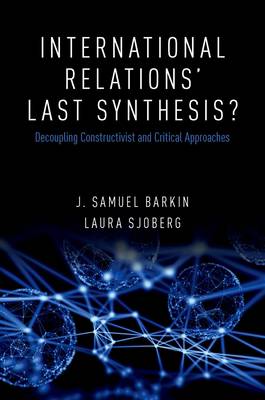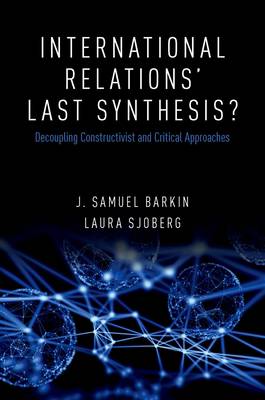
- Afhalen na 1 uur in een winkel met voorraad
- Gratis thuislevering in België vanaf € 30
- Ruim aanbod met 7 miljoen producten
- Afhalen na 1 uur in een winkel met voorraad
- Gratis thuislevering in België vanaf € 30
- Ruim aanbod met 7 miljoen producten
Zoeken
International Relations' Last Synthesis?
Decoupling Constructivist and Critical Approaches
J Samuel Barkin, Laura Sjoberg
Hardcover | Engels
€ 151,45
+ 302 punten
Omschrijving
Many scholars, intentionally or unintentionally, have entangled constructivisms and critical theories in problematic ways, either by assigning a critical-theoretical politics to constructivisms or by assuming the appropriateness of constructivist epistemology and methods for critical theorizing. IR's Last Synthesis? makes the argument that these connections mirror IR's grand theoretical syntheses of the 1980s and 1990s and have similar constraining effects on the possibilities of IR theory. They have been made without adequate reflection, in contradiction to the base assumptions of each theoretical perspective, and to the detriment of both knowledge accumulation about global politics and theoretical rigor in disciplinary IR. It is not that constructivisms and critical theories have no common ground; rather, the fact that it has become routine for IR scholars to overstate their common ground is counterproductive to the discovery and utilization of their potential dialogues. To that end, IR's Last Synthesis? argues that scholars using the two in conjunction should be cognizant of, rather than gloss over, the tensions between the approaches and the tools they have to offer. Along these lines, the book uses the concept of affordances to look at what each has to offer the other, and to argue for a modest, reflective, specified return to (constructivist and critical) IR theorizing. By rejecting its over-simple syntheses, this book hews a road toward reviving IR theorizing.
Specificaties
Betrokkenen
- Auteur(s):
- Uitgeverij:
Inhoud
- Aantal bladzijden:
- 232
- Taal:
- Engels
Eigenschappen
- Productcode (EAN):
- 9780190463427
- Verschijningsdatum:
- 25/03/2019
- Uitvoering:
- Hardcover
- Formaat:
- Genaaid
- Afmetingen:
- 173 mm x 246 mm
- Gewicht:
- 748 g

Alleen bij Standaard Boekhandel
+ 302 punten op je klantenkaart van Standaard Boekhandel
Beoordelingen
We publiceren alleen reviews die voldoen aan de voorwaarden voor reviews. Bekijk onze voorwaarden voor reviews.











